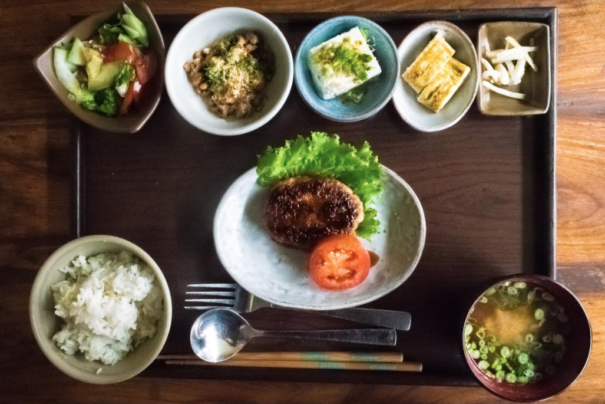
A Light Breakfast for Those Seeking Enlightenment

A Light Breakfast for Those Seeking Enlightenment
Nattō in Kathmandu
On a set of small plates, I am served Japanese hakumai (white rice), miso soup, and a teriyaki chicken hamburger. Next to this appears a small bowl of nattō, a fermented soybean-based dish that leaves thin, translucent strings webbed all over the plate. Natto is a bit slimy, yet apparently it is vitamin-rich, and a close cousin of Nepal’s own kinema, a pungent soy-based dish that can function as a side dish, soup, or dip in eastern Nepal. Like nattō, it’s an acquired taste.
This is breakfast in Hotel Kaze Darbar, a hotel geared towards the Himalayan country’s Japanese tourist market, which is surprisingly large, thanks to Japan’s interest in Nepal’s Buddhist heritage. (Buddhism came to Japan in the sixth century.) All across Kathmandu, vehicles carry the sign “Buddha was born in Nepal,” referring to Buddha’s birthplace in Lumbini, southern Nepal, which swells with pilgrims hungry for spiritual proximity to the Enlightened One. In 2015, Japan’s generosity to earthquake-stricken Nepal helped resuscitate its tourism-dependent economy, enabling the city to rebuild roads.
With more than 25,000 Buddhist temples in Japan expected to shutter in the next 25 years, Nepal has emerged as a destination for those seeking a spiritual lift or a reprieve from Japan’s punishing work culture. This partly explains the appeal of a place like Kaze Darbar, which serves small Japanese plates, offering rolled omelets in the form of tamagoyaki, or bite-sized portions of vegetables (kobachi).
The name of the hotel, Kaze Darbar, is a fusion: “Kaze” is a Japanese word for wind or breeze, and “Darbar” is a name for a royal palace in Nepal. Although the most ostentatious palaces erected by Nepal’s monarchs boasted neoclassical or baroque white-plastered exteriors, Kaze Darbar’s cherry-colored design and terracotta-tiled roofs are a break from that tradition. Its courtyards largely remain placid and empty, save for the limber men and women meditating before noon, waiting for their light breakfast of Japanese egg rolls, tsukemono (pickles), and tofu.